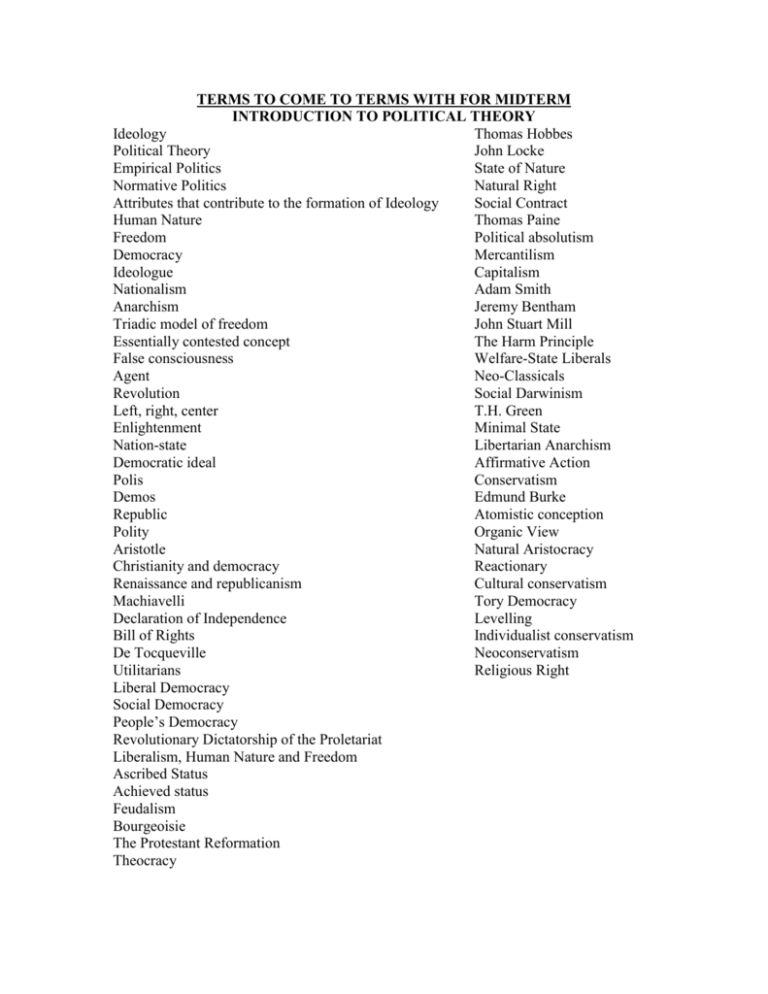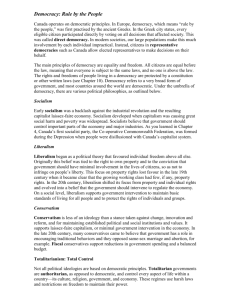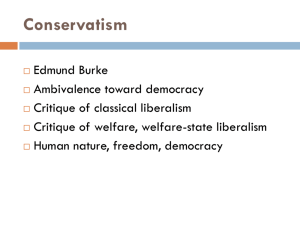Document
advertisement

TERMS TO COME TO TERMS WITH FOR MIDTERM INTRODUCTION TO POLITICAL THEORY Ideology Thomas Hobbes Political Theory John Locke Empirical Politics State of Nature Normative Politics Natural Right Attributes that contribute to the formation of Ideology Social Contract Human Nature Thomas Paine Freedom Political absolutism Democracy Mercantilism Ideologue Capitalism Nationalism Adam Smith Anarchism Jeremy Bentham Triadic model of freedom John Stuart Mill Essentially contested concept The Harm Principle False consciousness Welfare-State Liberals Agent Neo-Classicals Revolution Social Darwinism Left, right, center T.H. Green Enlightenment Minimal State Nation-state Libertarian Anarchism Democratic ideal Affirmative Action Polis Conservatism Demos Edmund Burke Republic Atomistic conception Polity Organic View Aristotle Natural Aristocracy Christianity and democracy Reactionary Renaissance and republicanism Cultural conservatism Machiavelli Tory Democracy Declaration of Independence Levelling Bill of Rights Individualist conservatism De Tocqueville Neoconservatism Utilitarians Religious Right Liberal Democracy Social Democracy People’s Democracy Revolutionary Dictatorship of the Proletariat Liberalism, Human Nature and Freedom Ascribed Status Achieved status Feudalism Bourgeoisie The Protestant Reformation Theocracy STUDY QUESTIONS FOR MIDTERM 1. Explain how Terrance Carver says the concept of Ideology has changed over the years and is applied today. 2. What does Euripides say are the benefits of democracy over despotism? 3. Explain the Pericles’ idea of Athenian democracy. 4. Explain Aristotle’s objection to democracy. What is the difference between the polity ruling and the demos. 5. Describe Machiavelli’s objections to princely rule. 6. John Adams defends the principle of republican government, how and why? 7. The Bill of Rights is a coveted document in the American system, what are the dangers of listed peoples’ rights and what are the benefits? 8. Alexis de Toqueville discusses the concept of equality in the United States. Explain his argument. 9. Explain John Stuart Mill’s protectionist argument. 10. Explain how far one should have a say in determining the direction of one’s country according to Walzer. 11. Refute Danielle Allen’s argument regarding the power of education in a system such as ours post-9-11. 12. Describe Hobbe’s view of human nature. What is the basis of obligation? 13. Explain when John Locke says the people have the right to rise up and revolt against their government. Can his notion be applied in 2006? 14. Thomas Paine was considered a “radical” when he wrote “Common Sense”, why? 15. Illustrate the key classical liberal ideas Thomas Jefferson used when writing the Declaration of Independence. 16. Explain Adam Smith’s defense of laissez-faire capitalism. 17. Explain what T.H. Green means by liberalism and positive freedom. 18. Describe Donald Allen’s concept of paternalism and its relationship to libertarianism. 19. Recap Edmund Burke’s argument in “Society, Reverence…”. 20. Explain what Joseph de Maistre means by “Conservatism as a Reaction”. 21. How is a poet like Wordsworth a conservative? 22. Explain Jose Ortega y Gasset’s opposition to the revolt of the masses. 23. Describe why Oakeshott says we must preserve tradition at all costs. 24. Bork argues that we are in the midst of a cultural decline. Define what he means by culture and re-state his argument. 25. Explain the “neo conservative persuasion”. 26. James Dobson says we should stand strong. Explain why he says we are a confused culture. 27. Compare and contrast a republic and a direct democracy. 28. Compare and contrast classical liberalism with modern liberalism. 29. Compare and contrast traditional conservatism with modern conservatism. 30. Compare and contrast modern liberalism with modern conservatism.







